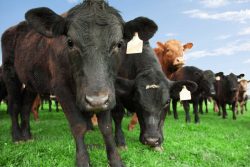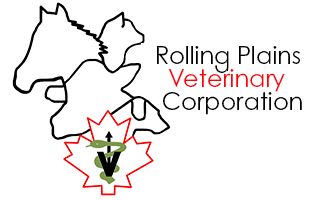
Owning dairy and beef cattle is a profitable venture, but only if your livestock is kept in optimal health. At Rolling Plains Veterinary Corporation, our years of expertise and experience allow us to deliver quality veterinary services to your cattle.
We’re here to provide your cattle with ultrasounds, vaccinations, examinations, diagnostic testing, surgery and all else needed for optimal health. We will work with you to keep you up to date and educated on antimicrobial use, cattle health conditions and more!
St. Claude and Notre Dame Vet Clinics are fully equipped with outdoor handling facilities and pull through trailer areas. Inside there are cattle squeeze chutes for examinations and surgery, as well as hoof trimming tables for problem feet.
We have fully equipped work vehicles to enable us to perform examinations, diagnostic tests, and surgery on farms with the proper handling facilities in Saint Claude, Rathwell, Haywood, and Manitoba, MB.
Our St. Claude and Notre Dame clinics are well stocked with both prescription and over-the-counter drugs and vaccines. Pay at time of pick up for a 10% discount!
What does a cow vet do?
The Canadian Animal Health Institute (CAHI) tells us that there 7.7 million pet dogs and 8.1 million pet cats in Canada. Because most Canadians are most familiar with the small animals that can come in and sleep in comfort every night, they think of small animal care when they think of veterinary care. But there are large animals that can’t be brought into a veterinary clinic when they have healthcare needs. These are the patients of Canada’s large-animal vets that spend their days, and sometimes nights, traveling from place to place in all kinds of weather.
The work of large animal vets can vary a great deal. Some large-animal veterinarians are cow vets, specializing in the needs of beef and dairy cows. Others are equine vets, specializing in treating horses. There are also large-animal vets who tend to the healthcare needs of buffalo, llamas, alpacas, sheep, and goats. In the prairie provinces of Canada, however, the greatest need for veterinary care is taking care of cattle.
The large-animal vet is the person you call when your horse has cut its leg on a fence, or when a cow is trying to deliver a calf by breech birth in the middle of the night. Large-animal vets, especially cow vets, provide a kind of mobile emergency room to keep cows, horses, and other range animals comfortable and healthy. City dwellers may never see cow vets or their colleagues, but we all depend on their services to keep these important animals well.
Got Dairy Cattle?
Our clinics strive to be proactive in the field of pet medications, with no exception in the dairy world. We emphasize the importance of herd health and preventive medicine, as well as food animal safety to all of our dairy producers.
We offer biweekly and monthly herd health visits to our dairy clients providing ultrasound veterinary services to allow for early pregnancy diagnosis and uterine examinations. We also consult with our clients on vaccination and treatment protocols, body condition scoring, udder health and milk quality issues.
We also provide a wide range of products and pharmaceuticals for your dairy needs. An in-clinic laboratory, as well as access to the provincial lab, provides our clients with many diagnostic options.
Beef Cattle
Biosecurity and Food Animal Safety are two major issues we deal with when it comes to beef herd health programs for our producers. As a veterinary team, we emphasize the importance of decreasing pathogen exposure and improving the herd’s immunity. We educate our clients on the benefits of proper antimicrobial use, both in selection and administration. We communicate the importance of yearly on farm visits for pregnancy diagnosis and body condition scoring.
Trust the veterinary services at St. Claude Veterinary Clinic for all your cattle needs. Contact us today for mobile vet help!
What kinds of services are available from RPVC?
Rolling Plains Veterinary Clinic is here to provide your cattle with ultrasounds, vaccinations, examinations, diagnostic testing, surgery and all else needed for optimal health. We will work with you to keep you up to date and educated on antimicrobial use, cattle health conditions and more!
The St. Claude and Notre Dame Vet Clinics are fully equipped with outdoor handling facilities and pull through trailer areas. Inside there are cattle squeeze chutes for examinations and surgery, as well as hoof trimming tables for problem feet.
We have fully equipped work vehicles to enable us to perform examinations, diagnostic tests, and surgery on farms with the proper handling facilities in Saint Claude, Rathwell, Haywood, and Manitoba, MB.
Our St. Claude and Notre Dame clinics are well stocked with both prescription and over-the-counter drugs and vaccines. Pay at time of pick up for a 10% discount!
Frequently Asked Questions
Q. In a large animal vet’s opinion, what makes beef production in Canada unique?
A. Canadian ranchers produce beef in a uniquely environmentally friendly way. Beef production in Canada generates less manure than comparable operations in the US and Europe. Canadian ranchers use less than half as many chemicals per kilogram of beef production as American ranchers, and less than 20 percent of the chemicals per kilogram of beef production as in the EU. Canadian ranchers and their large-animal veterinarians are highly skilled for keeping cattle production as close to the land as possible.
Q. Do RPVC veterinary services for beef and dairy cattle overlap?
A. All cows have similar healthcare needs, although there are differences between the breeds and differences on the basis of how much time the cow spends indoors. Traditionally, Canadian beef and dairy cattle producers have specialized in different breeds that have slightly different needs for veterinary care. In recent years, however, some dairy farmers have been breeding dairy cows to beef bulls so the cross-bred males (dairy farmers keep the females) can be sold to beef producers for a better price.
Q. Can I still get antibiotics for my beef cattle?
A. Yes, In Canada, the Health Canada and most provincial policy is that antibiotics are used to treat diseases and to prevent bacterial contamination of products offered for sale to consumers, not to prevent diseases or to promote growth. This does not mean that individual beef producers can be prevented from importing antibiotics and adding them to feed themselves, but Rolling Plains Veterinary Corporation supports practices that limit antibiotic resistance.
Q. How often do ranchers need to check on cows during calving season?
A. Canadian beef producers breed their cows in the late summer to encourage calving during late March, April, and May, when the worst winter weather is usually over. A general rule of thumb is that someone needs to check on cows every three hours, especially heifers that are having their first calf, when there are early indications of dystocia (an extra-large calf), when multiple cows are calving at the same time, and during cold, wet weather. Cows need attention if the early stages of delivery last more than six hours, if labor lasts longer than two hours, or if there are signs the calf is in distress, for example, breech or backwards birth, or a swollen tongue.
Q. What is the role of the large animal vet in backgrounding calves?
A. Backgrounding is process of feeding smaller calves on high forage feeds (with an emphasis on alfalfa, silage, and hay) and smaller amounts of grain from the time they are weaned until they are ready to be sold to a feedlot. This process supports slow weight gain, without putting on a lot of fat, up to about 350 kilograms.
Calves can be backgrounded in a lot or on open range and gain 650 grams to a kilogram a day. Backgrounding is not an efficient method of beef production when calves are under eight months of age and in above-average body condition since they lose weight on a high-forage diet. It is highly appropriate for a cow-calf operation when backgrounding calves gives a better selection of replacement heifers.
The large animal vet is an essential part of the entire backgrounding process. Although the vet is not directly involved in deworming, implantation of growth promoting hormone capsules, and vaccinations, producers need to consult vets on the appropriate sequence of BRSV, BVD, IVR, PI3, and anti-Clostridium vaccines, as well as vaccinations for scours.
The vet can check feed ratios for optimal weight gain under real time conditions, including supplemental salt, vitamin A, and limestone. The vet can verify the absence of issues with the provision of frost-free water. Vets are also helpful in designing feeders, so every calf has access to forage.
